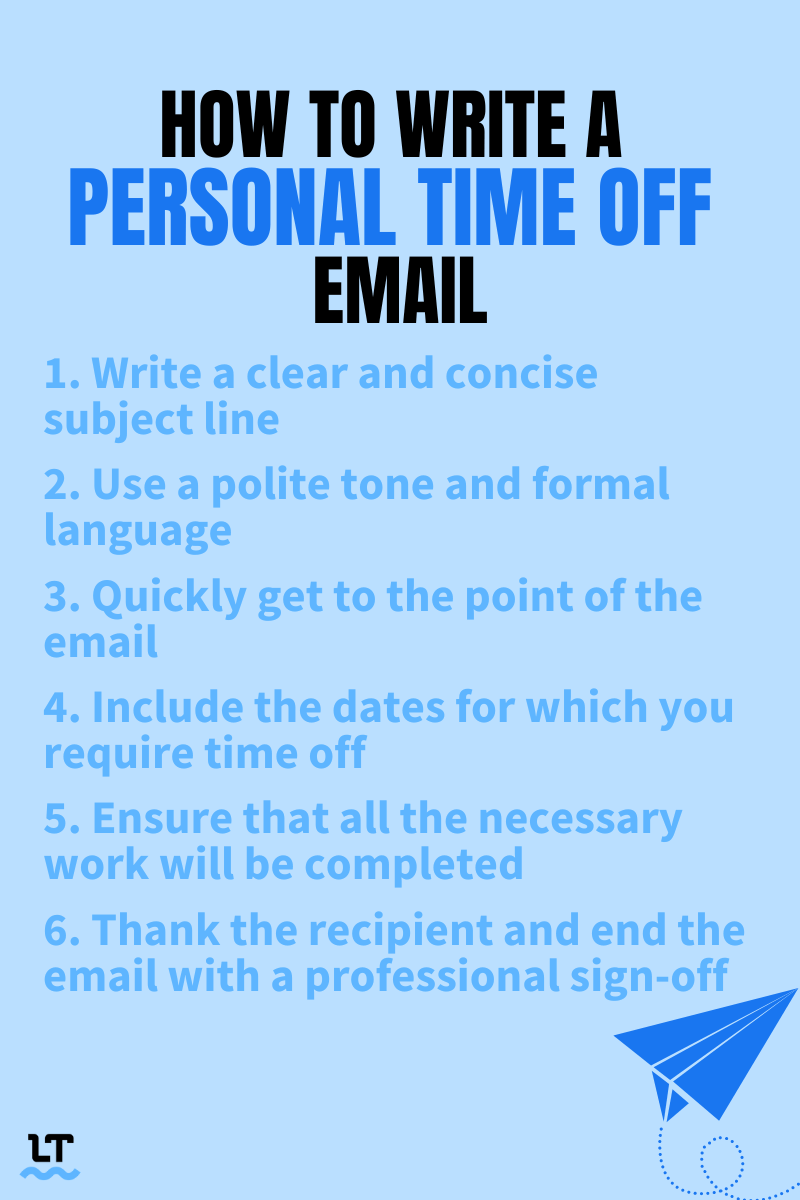Writing a Vacation Request Email: Table of Contents
Introduction: Requesting Time Off
Requesting Time Off
Whether you plan to go on vacation or simply need to attend to personal matters, you’re going to want to know how to write a clear and error-free time off request email. Below, we’ll show you how to write one, review helpful tips, and provide a time off email template that you can simply copy, paste, and send to your boss.
Let’s get started!

What Does “PTO” Stand For?
PTO stands for “paid time off.” It refers to a period of time in which employees are still paid when they take days off. PTO can encompass various types of paid leave, including vacations, sick days, and personal days. When writing to inform your boss about PTO, the steps and tips listed below can also apply.
How To Write a Vacation Request Email
Writing a vacation request email doesn’t have to be a nerve-racking experience. It’s as simple as following these steps:
1. Write a clear and concise subject line
Your boss (or whoever is signing off on your vacation request) probably gets countless emails every day. They most likely skim through the unread ones the same way you do and open those that appear to be the most important.
Make sure they open your time off request by including a clear and concise subject line. An email with a vague or wordy subject may fall to the bottom of their to-read list. Remember to include the date in the subject line, too.
Vacation Request July 3-13
Taking time off to spend my grandmother’s birthday with her and my family
The first example is succinct and direct, whereas the second one is vague and wordy.
2. Use a polite tone and formal language
It is imperative to use a polite tone. Remember that you’re asking, not demanding. Any suggestion otherwise may lead to a denial of your time off request. Additionally, as with any professional email, it’s important to use formal language and avoid colloquialisms.
3. Quickly get to the point of your email
Don’t ramble! Remember, your vacation request is just one of the numerous emails that have to be read. Get to the point immediately after the greeting.
One courteous sentence (e.g., I hope this email finds you well) beforehand is okay, but not always necessary.
We should note that including details about why you’re requesting time off is optional. Employees are allowed to maintain privacy. However, if you’d like to be transparent and add a few details, that’s okay, too. Just don’t include your entire itinerary.
4. Include the dates for which you require time off
Do not forget to include the dates you would like to take off. If not, the vacation request is up for interpretation, and that’s of no use to you. Be specific and include the exact days you need off.
5. Discuss how you’re ensuring that all necessary work will be completed
The biggest concern your boss or supervisor may have about granting your request is how your workload will be dealt with. That’s why it’s a good idea to be clear about how you’ve prepared for the time off and who will be filling in for your usual tasks while you’re gone.
6. Thank the recipient and end the email with a professional sign-off
Vacation request emails aren’t too different from other professional correspondence. Therefore, once the request has been made, thank the recipient and end the message with a professional sign-off like Best or Regards.
After all the steps above are followed, you should end up with a vacation request email similar to the following:
Subject Line: Vacation Request July 3-13
Dear Mrs. Patterson,
I’m writing to request July 3-13 off, as my grandmother will be visiting from Hungary and I would like to spend time with her.
I will ensure that all necessary tasks are finished before my time off. Most importantly, I’ll have the upcoming project completed a week before my leave, so you can review it and I can make any requested changes.
Additionally, I have spoken to Suzanne in my department, and she will be responding to any urgent emails or matters in my absence. I have taken the necessary steps to minimize any inconvenience and ensure a smooth operation while I’m gone.
Thank you for your time. If there is any further information you require, please let me know.
Best,
Dan Henderson
Tips for Requesting Time Off
There are a few tips to keep in mind when you are preparing to request time off.
Discuss it in person
It’s a good idea to have a discussion in person with your boss or supervisor before making the formal written request. This not only gives them time to prepare, but also gives you an idea of how many days you can take off, the length of your vacation, how to prepare, and other pertinent information.
Ask well ahead of time
The easiest way to get your vacation request denied is to ask a week or a few days before you intend to go on vacation. Give your boss and coworkers time to get ready for your absence by asking well ahead of time.
Know the company’s vacation policy
It will be difficult to get time off if you have unknowingly used all your vacation days. Familiarize yourself with the company’s vacation policy, so you can be as prepared as possible.
Choose convenient dates
If you want higher chances of your vacation request being approved, then choose dates that are convenient for the company, too. In other words, avoid those that are near important project deadlines, presentations, or meetings.
Time Off Emails: Ready-To-Use Template
If you’re short on time, below is a template you can copy and paste. Just make sure you fill out the bracketed text and make any additional necessary changes.
Subject Line: [Vacation Request/Time Off]
Dear [supervisor’s name],
I hope this email finds you well. I am writing to request [vacation time/time off] from [start date] to [end date]. I plan to [briefly mention the purpose of your vacation or time off, like spending time with family or attending to a personal matter].
I have made all the necessary arrangements to ensure that my absence causes no inconvenience. My colleagues have been made aware of my intention to take time off, and I have provided them with the necessary instructions. [Colleague name] will reply to and handle all urgent emails and matters.
Additionally, I have informed all our clients about my [vacation/time off] and have provided them with the contact information needed should they require any assistance while I’m gone.
If there are any questions or concerns, please let me know, so I can make the necessary adjustments.
I appreciate your time and look forward to hearing from you.
Best,
[Your name]
Write Flawlessly With LanguageTool

Your mind may already be in vacation mode, but it’s essential to be professional when writing any email in a business setting, including vacation request emails. That means you must ensure proper use of grammar, spelling, and punctuation.
LanguageTool is an advanced, multilingual writing assistant that can help rid your writing of various types of errors. Its paraphrasing feature can even help you maintain a professional tone and style.
The best part about it? It’s free to use! Give it a try, and never worry about mistakes in your emails again.

